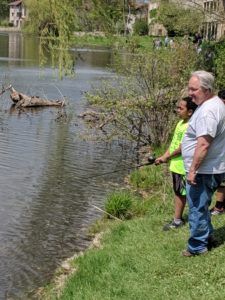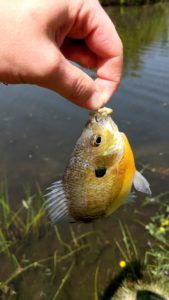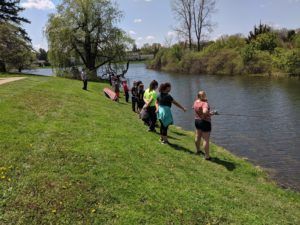Fishing with Project FISH
With a few sunny days last week and a short break from OTG Jr. field trips, I decided to sneak away from the cubicle farm at headquarters and join a former MUCC Education staffer to help take two groups of 5 th graders fishing. Mark Stephens who ran Michigan Out-of-Doors youth camp back in the ’90s is now the Program Coordinator for Project FISH. Project F.I.S.H stands for, Friends Involved in Sports Fishing Heritage. The mission of this program is to teach adults and youth fishing skills and fishing education. For more information on Project FISH, you can visit their website http://www.projectfish.org/

Mark has been running this program for more than two decades and has been taking kids and adults fishing all over the state during that time. Lucky for me, Mark lives in greater Lansing and has several hot spots throughout the area. Over two days we had roughly 200 fifth graders from the Haslett School District fishing with us. This top-secret water body was within walking distance to the kids’ school and the fishing was hot. With 100 kids fishing each day we were able to get every kid to land a fish and several students caught more than one.

Kids were able to learn how to bait their own hooks and proper casting techniques, as well as different fish species identification. Fish species caught included, largemouth bass, black crappie, bluegill and sunfish.

There were lots of smiles, squeals of excitement and high fives each day. Many of these kids were new to fishing and some of the more experienced kids were happy to help their peers get started. Kids teaching kids is one of the great things about programs like this!
Speaking of fishing, we still have a few spaces in the Michigan Out-of-Doors Youth camp this summer. So if there is an aspiring angler in your life feel free to send them to camp to have a great week learning about fishing. More information at camp can be found at http://www.mucccamp.org/.
The post Fishing with Project FISH appeared first on Michigan United Conservation Clubs.
Recent Posts



